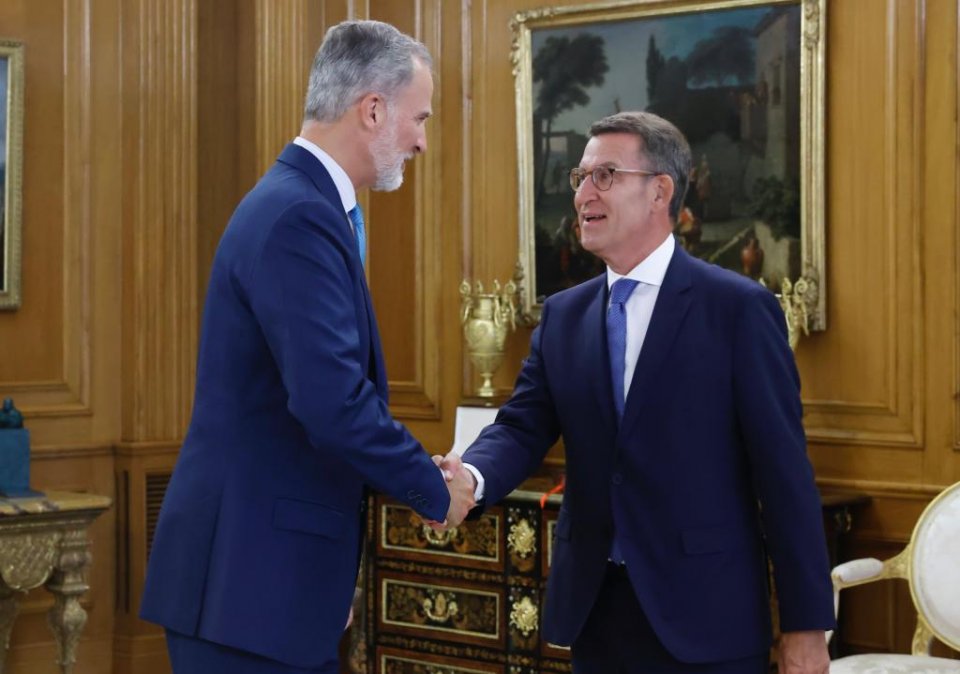King Felipe VI has instructed the leader of the right-wing People’s Party (PP), Alberto Núñez Feijóo, to try and form a government, despite not having the guaranteed support to do so.
The two-day investiture debate will start on 26 September with the vote on Feijóo’s bid to become prime minister taking place on 27 September.
The PP won the biggest share of votes and seats in the General Election held on Sunday 23 July, but fell short of an overall majority, even with the seats of the far-right Vox party, its main possible partner to form a government.
No party secured more than half of the Spanish Parliament’s 350 seats − the 176 threshold being the figure to win an absolute majority.
The PP finally won 137 seats (up 48 from 2019), but even with a possible coalition with Vox (33 seats), it is not enough to secure the majority required. Together with the support from two minor parties with one seat each (the Unión del Pueblo Navarra and the Coalición Canaria), Feijóo currently has the support of 172 MPs.
The socialist PSOE party led by acting Prime Minister Pedro Sánchez won 121 seats (up 1 from 2019) – and with the promised support of Sumar (31 seats), he currently has a confirmed total of 152 seats backing him.
Sumar brings together 15 small left-wing parties (including Podemos, the PSOE’s previous junior coalition partner), and is led by the current second Deputy Prime Minister Yolanda Díaz.
As with the previous PSOE-Podemos coalition, Sánchez has been seeking the support from other minor parties, including the Catalan pro-independence parties and the Basque nationalists, in search of the 24 seats required to reach the 176 majority. The Catalan parties, Junts per Catalunya (JxCat) and Esquerra Republicana (ERC) both have seven seats each (14 total). With the Basque parties EH Bildu (6), PNV (5), and the Galician BNG (1), it would make up a further 26 seats.
Last week’s election of a socialist Parliament Speaker, Francina Armengol, had been seen as an important win for Sánchez in his fight to be re-elected as prime minister. She secured 178 votes, with the support of the Catalan and Basque parties. ALSO READ: Socialist candidate Armengol elected as parliament speaker – seen as step to Sánchez securing re-election.
However, whilst Sánchez secured the support of the Catalan parties to vote in his candidate as parliament speaker, those same parties have set a high bar for their support for his investiture, calling for a sweeping amnesty for hundreds of Catalan activists facing legal action for their role in a failed 2017 independence bid – and it is not likely Sánchez will be able to reach a deal with them.
A statement issued by the Spanish Royal Family on Tuesday evening explained the monarch’s decision to select Feijóo over Sánchez, who had also expressed his willingness to seek an investiture vote, by highlighting that the PP ‘was the political party that obtained the greatest number of seats in the 23 July elections’.
‘Except for the XI legislature, in all the general elections held since the constitution came into force, the candidate of the political party that has obtained the most seats has been the first to be proposed by the king as a candidate,’ the statement read.
As is the custom after a general election in Spain, on Monday the king began meeting with the leaders of smaller parties as part of his role in determining the candidate with the most support to try and form a government. On Tuesday he met separately with Feijóo and Sánchez. The pro-independence Catalan parties and Basque nationalists did not meet with king Felipe.
If Feijóo fails to get a majority during ther first investiture vote on 27 September, he will face a second vote where just a simple majority of more yes than no votes are needed.
If he loses again, the king has to pick a new candidate — most likely Sánchez, whose party finished second.
If no candidate secures a majority within two months of the first investiture vote, new elections have to be called, which has happened with elections in both 2015 and 2019. The new general election would take place on 14 January 2024 in Spain.
Sánchez wants to return at the head of a ‘progressive’ government of centre and left-wing groups, and insists he can garner more votes than Feijóo.
ALSO READ: With Sánchez and Feijóo both claiming victory in the election … what happens next?
El Rey recibe en audiencia a Alberto Núñez Feijóo, del Partido Popular (PP).
— Casa de S.M. el Rey (@CasaReal) August 22, 2023
➡️https://t.co/eCmlpvarW3 pic.twitter.com/pscj8C0XDO
Audiencia del Rey a Pedro Sánchez Pérez-Castejón, del Partido Socialista Obrero Español (PSOE).
— Casa de S.M. el Rey (@CasaReal) August 22, 2023
➡️https://t.co/eCmlpv9U6v pic.twitter.com/Gyv6LLP9wZ
Sign up for the FREE Weekly Newsletter from Spain in English.
Please support Spain in English with a donation.
Click here to get your business activity or services listed on our DIRECTORY.



